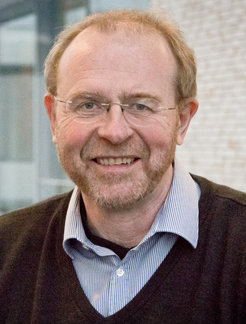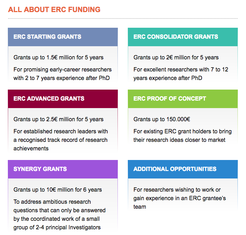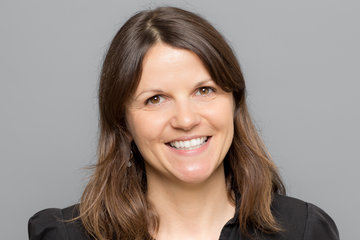EU funding for Freiburg Max Planck Director
Thomas Boehm receives his second ERC Advanced Grant
Advanced Grants of the European Research Council (ERC) support long-term research projects characterized by ambitious ideas, unconventional methods, and a pioneering spirit. Immunologist Thomas Boehm has now been able to secure his second ERC Advanced Grant. Together with his research group at the Max Planck Institute of Immunobiology and Epigenetics (MPI-IE) in Freiburg, he investigates fundamental principles of immune defense. In the most recent research project, which is now funded with 2.5 million euros, the characteristics of the immune systems of different vertebrates will be investigated in a comparative manner. This work aims at identifying universal design principles of adaptive immunity in vertebrates to gain an entirely new perspective on the immune functions of humans.

Cells of the adaptive immune system protect the body from pathogens, such as viruses and bacteria. This immune response is based on a sophisticated and complex mechanisms, by which highly specialized T- and B-lymphocytes target and destroy the pathogens. At the same time, these cells also form an immunological memory in order to be able to react more quickly in the event of re-exposure to the same pathogen.
Research on the immunological Big Bang
Research in recent years has shown that all vertebrates have a powerful and adaptive defense mechanism. “Today, we know that adaptive immunity must have evolved at least twice independently in early vertebrates” explains Thomas Boehm, Director at the Max Planck Institute of Immunobiology and Epigenetics. As much as the immune systems of the two sister groups of vertebrates (the so-called jawless and jawed vertebrates) differ in the molecular details, it appears that general design principles of these two systems are surprisingly similar. It has been found, for example, that primitive vertebrates such as the fish-like lamprey, a so-called living fossil which evolved around 500 million years ago, already possess two different lymphocyte lineages that resemble the T and B cells of jawed vertebrates such as mouse and human. Moreover, these cell types also develop in functionally equivalent organ structures.
An evolutionary informed research approach
“The fact that alternative forms of adaptive immunity developed independently of each other in these two related groups of vertebrates about 500 million years ago is a striking example of convergent evolution. This gives us the unique opportunity to examine the strategies that nature chose to realize adaptive immune functions in complex organisms, such as vertebrates,” says Thomas Boehm. Once the similarities between ancient creatures such as lampreys and mammals such as mice and humans are discovered, Boehm’s research group aims at using this information to develop non-intuitive therapeutic strategies to address failing immune functions and autoimmune syndromes.
Common design principles of adaptive immunity in vertebrates
The immune system of humans and mice is well understood. The ERC project specifically targets the immune system of lampreys. “Our experiments will address the development and characteristics of various T cell lineages, we will look into the organ structures in which these cells develop, and we will study the mechanisms that are essential for the self-nonself discrimination by the antigen receptors of lampreys. This work will be based on recently developed methods allowing the genetic modification of the lamprey genome, a goal that was previously unattainable. This large-scale genetic approach is unprecedented and lies at the heart of the current project”, describes Thomas Boehm his comprehensive research approach.
Focusing on the molecular basis of the immune system in lampreys, the Max Planck researchers are closing an important gap in their evolutionary journey, during which they have already analysed the genomes and the gene expression patterns of lancelets, sharks, zebrafish, mice and humans. The aim is to identify common design principles of adaptive immunity valid for all vertebrates.
- ERC project name: Towards identification of the unifying principles of vertebrate adaptive immunity (ImmUne)
- Thomas Boehms research: lab page
ERC Advanced Grants

The ERC Advanced Grants are one of the most important funding instruments of the European Union and are awarded to established scientists from all disciplines whose highly innovative research goes far beyond the current state of research and opens up new avenues for the field. The award is granted by the European Research Council (ERC) to outstanding scientists from all over the world who are currently working at a European research institution. In the current competition in 2019, 222 European researchers received funding from the ERC, which represents a success rate of approx. 11% (2,052 research proposals were submitted). The Max Planck Society (MPG) was among the most successful institutions in Germany. Eight ERC Advanced Grants went to researchers at the MPG. They each receive up to 2.5 million euros over five years for their research projects.
The 2019 ERC funding for Thomas Boehm is already the second ERC Advanced Grant in the career of the Freiburg immunologist. Already in 2014, a project dedicated to the elucidation of genetic networks that are essential for the development and function of the thymus cells secured highly competitive funding by the European Research Council. With the ERC Advanced Grant 2019 for Thomas Boehm, the MPI-IE in Freiburg was granted its 12th ERC funding, including two Advanced Grants for Thomas Boehm, four Consolidator Grants and six Starting Grants for scientists of the institute.
CV Thomas Boehm
Thomas Boehm studied human medicine at the Johann Wolfgang Goethe University in Frankfurt am Main, and received additional training at Columbia University in New York (USA) and the Royal Marsden Hospital in London (England). Thomas Boehm graduated in Frankfurt in 1982, where he also qualified as a university lecturer in 1988. After clinical training in pediatrics and human genetics, and research at the MRC Laboratory of Molecular Biology in Cambridge (England), he took up professorships for Medical Molecular Biology at the Albert-Ludwigs University Freiburg and Experimental Therapy at the German Cancer Research Center in Heidelberg. Since January 1998, Thomas Boehm is director at the Max Planck Institute of Immunobiology and Epigenetics in Freiburg and an Honorary Professor at the Medical Faculty of the University of Freiburg. Thomas Boehm is a member of several learned societies, including the European Molecular Biology Organization, the German Academy of Sciences, as well as Heidelberg Academy of Sciences and Humanities. In January 2018, he has been appointed Chairman of Scientific Council of the Paul Ehrlich-Foundation. He is the recipient of several awards, including the Gottfried-Wilhelm-Leibniz Prize of the German Science Foundation, and the Ernst Jung Prize for Medicine.













